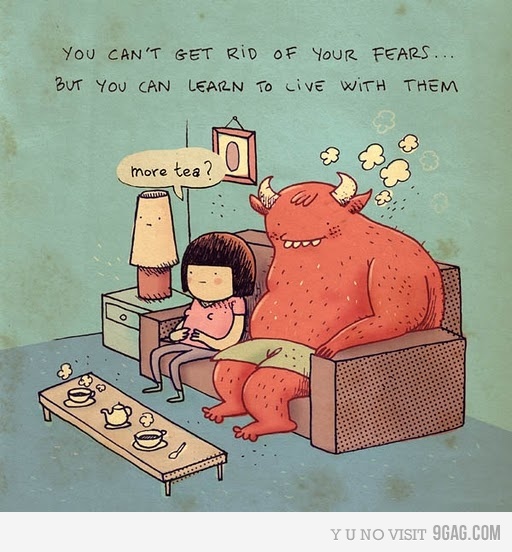There are certain fears that we should respect. Fear of cliffs. Fear of snapping dogs. Fear of a person who is threatening to kill
us. But when we fear whole groups of
people—Blacks, Muslims, the homeless—then we no longer have a proper fear, but
rather anxiety. We are fearful of that
which we do not know will harm us.
Our most natural responses to
fear is to either fight or run. But they
are not the only responses possible for human beings. We might also discuss or argue, threaten or
remain passive, we might listen and understand, we might control or establish
peace. When we are authorities, we have
even more options than others to that which we fear. We can order, we can encourage, we can bring
in others to help us, we can meet needs.
I can’t tell people what to fear
or not fear. I can’t tell people what
they should be anxious about or not. But
I do know from my own experience that I can control my fear and choose to be
rational.
When I was a child I was
attacked by a dog in front of my house.
Since then, barking dogs set an immediate fear response in me. I can’t control the shot of fear that goes
through my brain, but I can recognize in the second moment whether the dog is
really a threat or not, and whether someone is handling their dog
appropriately. One time I was out on a
trail and an unleased dog was barking at me.
I was wildly afraid of that dog, and the owners telling me that the dog
was nice did nothing to ease my mind because the dog clearly did not like
me. I had options. I could have kicked the dog. I could have yelled at the owners for their
irresponsibility. I could have decided
never to go out on that trail again.
What I chose to do is to firmly ask the owners to keep their dog away
from me, and to remind them that the dog should be on a leash.
If a dog is on my property and
getting out of control, I have more options.
I could say that no dogs are allowed on the property; I could just
ignore the dogs and let them do what they want; or I can get with dog owners
and establish a policy that works for everyone.
Because that last was the peaceful solution, allowing ministry to be
done for everyone, that’s what we did.
We want to choose options that are best for everyone, despite our fears
or anxieties.
As followers of Jesus, we should
not allow our fears or anxieties control us.
Rather, by the direction and power of the Holy Spirit, we should set
aside our fears in order to live with everyone in love and peace. If we are directed by our fears, it will
spell disaster for everyone.
Yesterday, I was in a crowded
parking lot. An older lady was having
trouble making a left turn and ended up having to back up and start again. Another lady was waiting for her to move, and
when she saw the first lady back up, she became nervous and backed her car up
as well, even though the first lady wasn’t going to get close to her vehicle. That’s no problem, of course, being overly
cautious and taking care to avoid an accident that wasn’t going to happen,
right? Well, it would have been fine,
except that there was a group of three children walking behind the second
vehicle, and the second lady was fearful enough of what was happening in front
of her, that she didn’t notice the children that she was running into.
When we have power, like a car,
we might think of ourselves as a weak, frail human being, but every movement we
make affects others. If we are careless,
or respond out of our own deep need or fears, we can harm the weak and the
innocent. When we have power, every
move we make is powerful. And if we use
our power in response to fear, rather than a drive to act in peace for everyone
around us, then we will be destroyers of peace, and destroyers of lives.
When we use power, we must seek
the benefit of all, not just a few. And
if we use power primarily for our own survival, or lifestyle or in response to
our fears, then we can cause destruction to many. It doesn’t matter if that power is money or
weapons or authority. We have a responsibility
to everyone around us, especially those weaker than us, to use our power for
peace, not our personal protection.


No comments:
Post a Comment